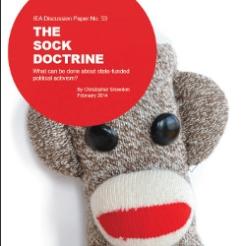The government's new clause preventing charities lobbying is based on dubious logic and unreliable research, says David Ainsworth.
On Saturday the government announced that charities couldn’t use government grant money to lobby. Here’s the clause which will be inserted in all future grant agreements:
“The following costs are not eligible expenditure: payments that support activity intended to influence or attempt to influence Parliament, government or political parties, or attempting to influence the awarding or renewal of contracts and grants, or attempting to influence legislative or regulatory action.”
It doesn’t take long to see the problem. Charities often, in the course of their work, discover that government is spending money badly, and on the wrong things, or that more money needs to be spent to solve a particular problem. Evidently they want to say so.
You would think that government, having paid experts to solve an intractable social problem, would want to hear what those experts have to say. Instead, this is effectively the government covering its ears – or more accurately, charities’ mouths – to ensure it doesn’t hear bad news.
Charities, obviously, believe this is intended to silence criticism – whether because government doesn’t want the sector to be critical in public, or it just doesn’t want to know that it’s screwing things up.
After all, the sector has been critical of government policy on all sorts of fronts, mostly to do with its disgraceful treatment of people in poverty. This makes it much more difficult to speak out, because inevitably the people who are funded to help the poor and vulnerable also want to speak on their behalf.
Why the government says it is doing this
The government’s explanation as to why it is doing this is rather Machiavellian and tortuous. Quite Byzantine. A bit Sir Humphreyish.
Here’s what Matt Hancock has to say on the subject:
“The Institute of Economic Affairs has undertaken extensive research on so-called ‘sock puppets’, exposing the practice of taxpayers’ money given to pressure groups being diverted to fund lobbying rather than good causes or public services.
“Taxpayers’ money must be spent on improving people’s lives and spreading opportunities, not wasted on the farce of government lobbying government. The public sector never lobbies for lower taxes and less state spending, and it’s a zero sum game if Peter is robbed to pay Paul.”
I have some problems with this.
First, the IEA hasn’t actually done “extensive research”. It’s not really done any research. It’s produced two discussion papers, one in 2012, called Sock Puppets: How the government lobbies itself and why, and one in 2014, called The Sock Doctrine - What can be done about state-funded political activism? Both of them are essentially polemics by Christopher Snowdon, one of the IEA’s writers. They contain little data, and draw conclusions based on broad trends.
The reports assert, basically, that government often wants to spend money on unpopular things. Rather than just spend that money, it likes to soften up public opinion by funding a charity which supports that cause, in order to encourage the public to back the idea.
The reports say that these organisations, which Snowdon refers to as “sock puppets”, should not be funded by government.
Hancock claims to have bravely taken this on board, and is taking action, but his argument is confusing. It goes like this:
1. The government is worried that it might be lobbying itself to spend money on things that the public doesn’t support.
2. The government thinks it is possible that it is doing so by giving money to sympathetic charities, known as “sock puppets”.
3. The government has decided it needs to introduce a new clause to contracts to prevent the charities it has funded from doing that lobbying.
Off the top of my head there seems to be a simpler solution. If you don’t want to surreptitiously lobby yourself via a third party then, er, don’t. No need to involve anyone else at all.









